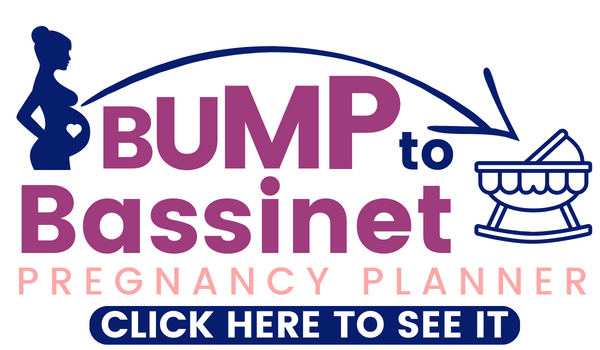Cramping during your second trimester of pregnancy can be worrisome. What should you do if you’re feeling cramping around 24 weeks of pregnancy? This article will share what to watch for and when you should call your provider if you are experiencing this.

But first, how do I know so much about “cramping”?
Hi — I’m Hilary — The Pregnancy Nurse 👩⚕️. I have been a nurse since 1997 and I have 20 years of OB nursing experience, I am also the curly head behind Pulling Curls and The Online Prenatal Class for Couples. 🩺 I have seen thousands of patients complaining of cramping in their second trimester and have worked to find out what’s happening, so I’m a good resource on this one.
As a note, nothing in this article should be taken as advice. If you are having contractions at 24 weeks you need to speak with your health care provider ASAP, as it can be a sign of premature labor. Most providers have someone on call 24/7 that you can talk to. This article is purely informational for you as you wait for them to return your call.
Cramping at 24 Weeks of Pregnancy — What Should You Do?
First thing, grab your phone and sit down. The cramping could be from an activity you were doing, and it could just be one — but it’s something you need to monitor (a good idea is to use the notes app on your phone to note times and what you’re feeling so you remember).
Things to ask yourself:
- Does the cramp go away (or lasts a long time)
- Are there more of them?
- How frequent are they?
- What else are you feeling?
- Are you having other symptoms (discharge, nausea etc).
If you don’t feel anything else and it quickly resolves it’s something to keep an eye on. However, if the cramping continues you need to call your provider ASAP. Mot providers will have someone on to take calls for reasons like this 24/7. You may need to wait for a return call from a provider though, so let’s keep talking about what your body is experiencing.
Cramping at 24 weeks is different than first trimester cramping, but you need to monitor it to prevent premature birth.
BTW if you enjoy quality information for pregnancy and birth check out this!
What Causes Cramps During Pregnancy?
It’s really hard, because cramping means different things to different people. Most women think of menstrual-like cramps, but sometimes it’s hard to remember what those even felt like now that you’ve been without a period for a while.
For most people “cramping” means diffuse pain (meaning not just in ONE spot) in their abdomen that comes and goes.
Cramps during pregnancy can be a common experience for pregnant women. They are usually caused by the stretching of the uterus and ligaments around the abdomen. As the uterus expands to accommodate the growing baby, it can put pressure on the ligaments that support it, causing discomfort in the lower abdomen. This is known as round ligament pain and typically occurs in the second and third trimesters.
However, severe pain or continuing cramps that are accompanied by vaginal bleeding, or changes in vaginal discharge, could indicate preterm labor and should be reported to your healthcare provider immediately.
In general, cramps during pregnancy are a normal part of a healthy pregnancy and can be managed with simple measures such as changing positions, gentle stretching, and taking warm baths. It is important to pay attention to pregnancy symptoms and seek medical attention if cramps become severe or frequent, as this could indicate a more serious problem. Ultimately, cramps during pregnancy are a common and temporary discomfort that will likely subside once the baby is born.
Pro Tip: There are also LEG CRAMPS in pregnancy due to changes in blood flow and changes in what your body needs (as far as electrolytes and minerals) during pregnancy, and those are different (but also very annoying).
What Different Types of Cramps Are?
If you have sharp pain at the sides of your uterus/pelvis it could be those ligaments getting mad. While this is actually the most painful, it’s less worrisome because ornery ligaments are expected. Some people find that a heating pad can help them. You may want to change positions more slowly to help them not feel so stretched.
If you have long periods of abdominal pain (lasting well over a minute) it may be the uterus growing and things shifting.
If you have cramps that last 20-60 seconds and come back every few minutes that is more likely contractions (and more disconcerting). Some “practice contractions” at this point aren’t unusual, so be sure to ask your provider about what number in a hour is OK for you. You may also feel your uterus get hard (and then soften between the pains).
If you’re having pelvic pressure along with cramping that’s something you want to call your doctor or midwife about too.
It could also be stomach pain and cramps from something you ate, so that’s something to be aware of too (often comes with some nauseas or changes in stool though also).
Sometimes the specific cause of your cramps is hard to pinpoint.
However, if there are ANY questions you need to call your provider so you can work it out together. There is a test they can give (called Fetal Fibronectin) to see if you are in preterm labor, so that’s a great option if there are ANY questions at this point.
What should I be feeling at 24 weeks pregnant?
24 weeks is an exciting time in your pregnancy, and you are hopefully feeling pretty great during your second trimester.
Your baby may seem very active suddenly. This is typically the time when you start to feel more movement from your growing baby and may even be able to see some of their kicks and jabs poking through your skin (be sure to show your partner, they’ll get a “kick” out of seeing it with their own eyes). As you head into your third trimester you’ll start doing kick counts.
You may also notice more physical changes in your body, such as your baby bump growing larger (possibly even stretch marks) and your breasts becoming fuller. Along with these changes, you may also start to experience some discomfort, such as back pain and fatigue, as your body adjusts to the weight of your growing baby.
Like I mentioned above you may also be getting leg cramps (and yes, they are SUPER annoying). Be sure to stretch and talk with your provider about any diet changes that might help them (and keep taking your prenatal vitamins).
However, it’s important to remember that every pregnancy is different and you may not experience all of these symptoms. It’s always best to talk to your healthcare provider if you have any concerns about your pregnancy or if you experience any new or concerning symptoms.
When is abdominal pain a worry in the second trimester?
Abdominal pain can be pretty common during pregnancy, especially as you get further into your second trimester.
However, there are certain situations where abdominal pain can be a cause for concern. If the pain is severe, comes and goes or accompanied by vaginal bleeding, fever, or chills, it is important to seek medical attention right away.
These symptoms could indicate a serious issue such as preterm labor at this point.
Additionally, if the abdominal pain is persistent and does not go away with rest or changes in position, it could be a sign of an underlying medical condition such as appendicitis or urinary tract infection (bladder infection). It is always better to err on the side of caution and seek medical advice if you are experiencing abdominal pain during the second trimester of pregnancy.
How Many Months Is 24 Weeks Pregnant?
If you’re 24 weeks pregnant, congratulations! You’ve officially made it to the second trimester of your pregnancy. In terms of months, this puts you at around six months pregnant, as each month typically consists of roughly four weeks (but every month varies, which is why the medical community counts it in weeks). I have a whole post on how many weeks six months pregnant is that explains more about that.
At 24 weeks pregnant, your baby is about the size of an ear of corn (or an eggplant) and is growing rapidly. During this time, you’ll likely experience a variety of symptoms and changes as your body adjusts to the demands of pregnancy. Although it can be challenging at times, 24 weeks is an exciting milestone in your pregnancy journey and brings you one step closer to meeting your little one.

What happens during the 24th week of pregnancy?
At 24 weeks pregnant, the uterus has grown significantly, and the baby weighs about a pound and 8 inches long.
This week marks an important milestone as you have reached viability for your fetus, which means they now have a chance of survival if they were to be born early. The baby’s lungs are continuing to develop, and they are beginning to practice breathing movements by inhaling and exhaling amniotic fluid. The baby’s brain is also growing rapidly, with over one million neurons being formed every minute.
The top of your uterus (called your fundus) is just above your belly button at this point.
You may start experiencing more discomfort or back pain as her bump grows, and she may begin to feel her baby’s movements more frequently. Overall, the 24th week of pregnancy signifies a period of significant developmental changes for both the mother and the baby.
You may have an increase in weight gain as morning sickness leaves, food seems more tolerable, and your taste buds perk up in the 2nd trimester. Both you and baby are starting to put on a bit of size in this stage of pregnancy.
If you’re interested in more on what’s happening in your pregnancy week by week, check out my pregnancy planner, it’s a fun way to stay on top of things, and keep lots of memories for your new baby.
Why would you get more cramps at 24 weeks of pregnancy?
It is mainly due to the baby now starting to put on size rather than just growing all their parts. The round ligaments that hold your uterus to your body are starting to stretch.
Think of your uterus as a balloon that is tied to your body in 4 corners. As the balloon gets bigger, those ligaments expand like rubber bands. As they stretch they get uncomfortable causing that cramping feeling.
Your uterus itself also may cramp as it’s growing (also called Braxton Hicks contractions or “practice contractions”). Also, your bladder, intestines and all the things in your abdomen may get a little ornery as they move to make room for baby.
All of this shifting can cause some lower back pain as your center of gravity is changing your posture has to adjust a bit.
These types of cramps can also come due to dehydration, so make sure that you’re drinking plenty of water, and eating meals that balance proteins and carbohydrates (nuts, or cheese and crackers, or an apple and peanut butter). I actually have a bonus video in here that talks all about prenatal nutrition.
Week 24 of Pregnancy: Your Checklist
If you are 24 weeks pregnant, it is important to stay on top of your health and preparations for the upcoming arrival of your baby. Your 24 week check-up with your provider (not always at 24 weeks, but hopefully you have just had one or will have one in the next couple of weeks) your provider will go over a few things with you, like:
- Scheduling a glucose screening test to test for gestational diabetes (The American College of Obstetricians and Gynecologists recommends it usually between 24 and 28 weeks)
- Discussing childbirth options (starting a birth plan and making sure you know what hospital you’re delivering that)
- Attending prenatal classes is a high priority at this point too — this one can easily be done online in just a few hours and is meant to involve your partner!
It is important to stay up-to-date on appointments with your healthcare provider and to inform them of any concerns or questions you may have. Taking care of your own health and preparing for your baby’s arrival can help ensure a healthy and smooth pregnancy experience. You’ll also want to be really clear on how to call your doctor or another provider when the office is closed.
In addition to the “medical” things it’s time to start getting ready for this baby to come live with you forever. Which is why my pregnancy planner includes checklists for that too!
I hope you’ve called your doctor if you think the cramping is going somewhere by this point. Pregnancy can be a REALLY anxious time, but The Online Prenatal Class for Couples has proven to help couples feel more prepared and excited for their delivery. NOW is the time to get your prenatal education going, so I hope you’ll join me in there!
And, if you’re not quite sure you’re ready for that whole thing, check out my free prenatal class. It’s your first step toward getting in the driver’s seat of your birth.
Don’t miss my super helpful post all about the signs of labor. Great info for pregnancy!






 Once Baby is Head Down Can They Turn Again?
Once Baby is Head Down Can They Turn Again?
